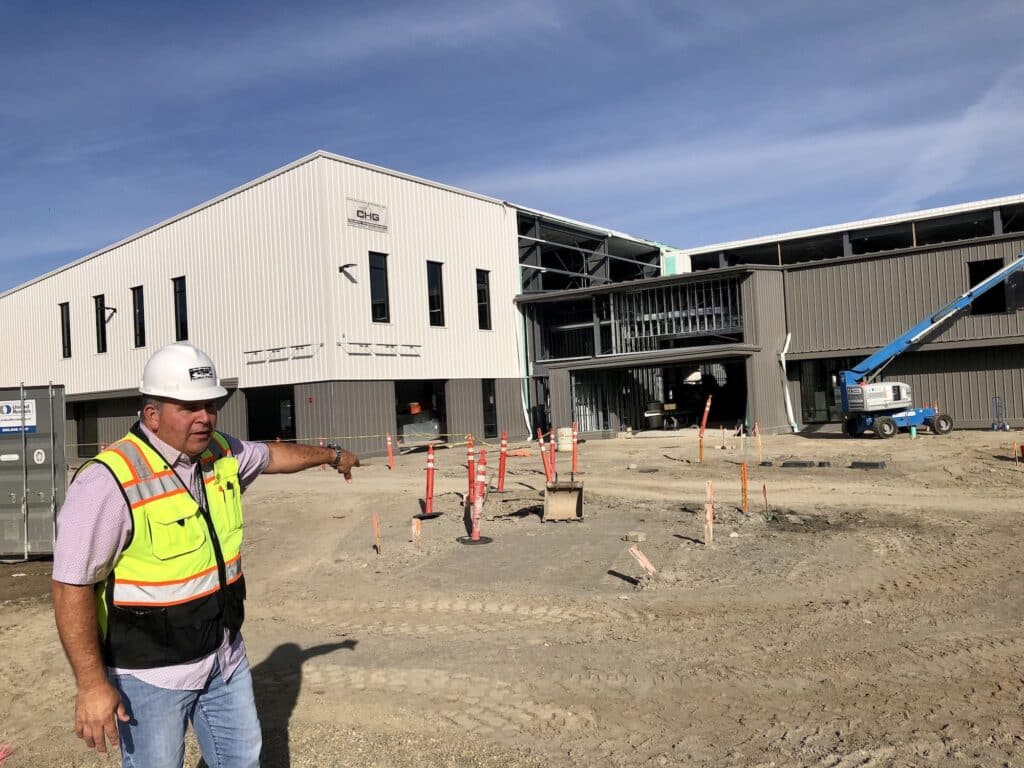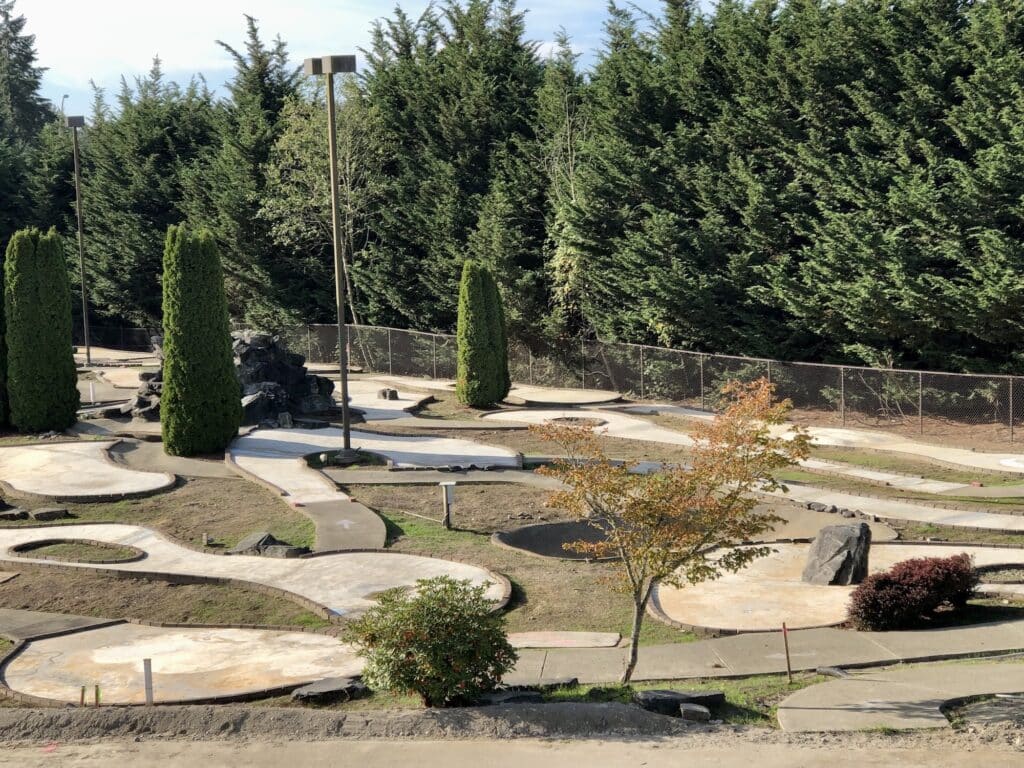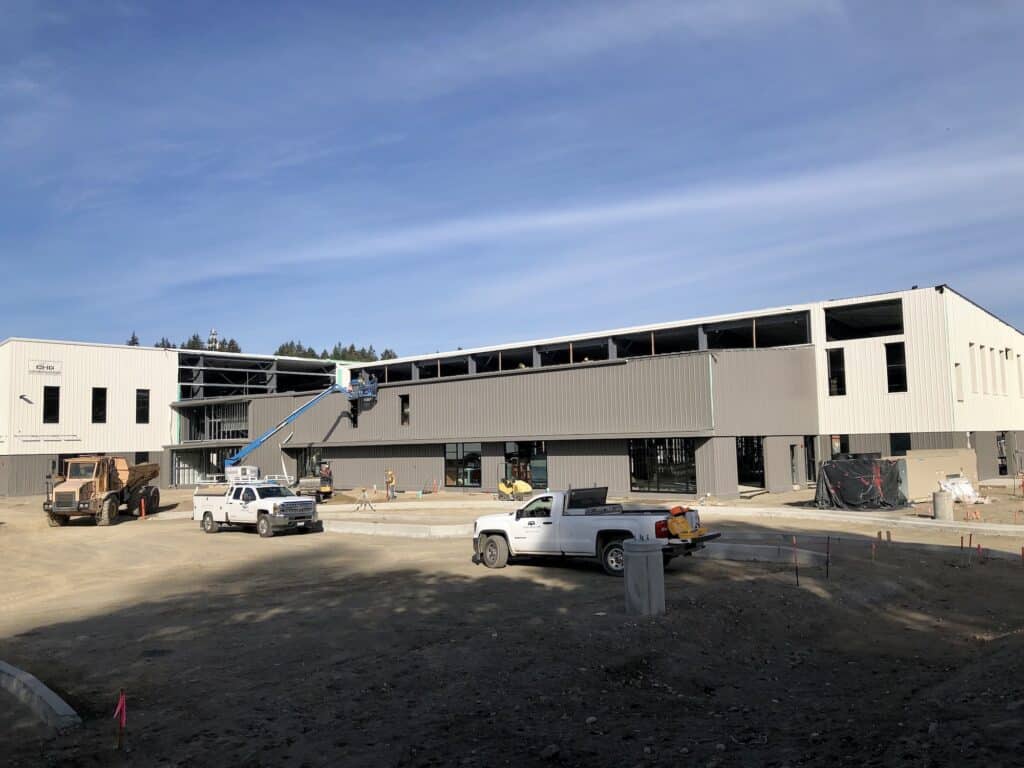Community Government Health & Wellness
2025 PenMet budgets show shift from building to operating rec center
PenMet Parks’ proposed 2025 operating and capital budgets illustrate a transition from building the Community Recreation Center to operating it.
Community Sponsor
Community stories are made possible in part by Peninsula Light Co, a proud sponsor of Gig Harbor Now.
Contractors broke ground on the $31.6 million facility in August 2023 with completion expected 13 months thereafter. Supply chain issues pushed the opening date to spring 2025. However, progress on the 58,000-square-foot indoor center helped reduce the capital budget from $29 million this year to $14.9 million in 2025. More than two-thirds of that is being carried over from 2024, primarily for the CRC. Only $3.1 million is new for 2025.

PenMet Project Manager John Adams explains how the walkways and large lawn will be oriented in front of the recreation center. Photo by Ed Friedrich
During a Tuesday study session, Executive Director Abby Bujacich and Finance Director Jessica Wigle described the budgets to parks commissioners.
“It’s a budget, but it’s also telling the story of PenMet Parks for 2025,” Bujacich said.
Rec center walls are up
Through a wall of windows behind Commissioners Billy Sehmel, Laurel Kingsbury, Missy Hill and Kurt Grimmer (Steve Nixon was on Zoom), gray and white steel walls framed the materializing building. Graded dirt awaited asphalt and concrete driveways, parking lots and sidewalks. Curbing popped through it.
As of August, $11.6 million remained in the capital budget to complete the project along 14th Avenue NW, site of the former Performance Golf Center. Once opened, it will be staffed by 3.6 full-time-equivalent employees, according to the operating budget. Seventy percent of its operating costs will be recouped through user fees, Bujacich said.
Other than the recreation center employees, PenMet plans to add just 1.1 FTEs in 2025 because staffing has stabilized as the parks district matured, said Bujacich. Total employees will increase from 51.1 to 55.8 FTEs.
2025 capital priorities
The 2025 construction budget wasn’t discussed Tuesday because it had been a retreat topic, but a list of 2025 priorities was presented. It is devoid of big-ticket items relative to recent years.
- They are, in priority order:
1. Cooling and exhaust maintenance at Volunteer Vern Pavilion: $400,588
2. Strategic property acquisition: $300,000
3. Heavy equipment acquisition: $0
4. Peninsula Gardens Phase 1: $500,000
5. Demolish Island Boulevard structures/Wollochet garage: $95,000
6. Narrows Park accessibility improvements/restroom: $650,000
7. Tubby’s Trail Dog Park amenities: $350,000
8. McCormick Forest Phase 1 trails: $550,000
9. Art installation: $25,000
10. Vans, maintenance vehicle: $275,000
Total 2025 priorities $3,145,588

Work is progressing on rehabilitating the mini-golf course at the recreation center. A big change will occur next week when the turf is installed. Photo by Ed Friedrich
In addition, $11.8 million is being carried forward from 2024. As of August, that includes the CRC; $1.7 million for DeMolay Sandspit development and $303,000 for a match to acquire two adjacent properties there; $586,000 to upgrade the CRC mini-golf course; $500,000 for undetermined use at Madrona Links Golf Course and $500,000 for strategic priorities there; and $382,000 to replace the administrative offices’ HVAC system.
$6.5 million operating budget
PenMet’s operating budget will increase from $5.9 million this year to $6.5 million in 2005. The bulk is divided among park operations ($2.2 million/34%), finance and IT ($1.4 million/22%), administrative services ($814,000/12%), park services ($736,000/11%) and the executive office ($567,000/9%).
The district plans to increase services by 46%, about half coming from the new recreation center and mini-golf course but also growth in all other categories. Sports, by far the largest offering, will expand by 26% participant hours. Smaller programs such as special events (135%), adaptive/specialized (82%), seniors (59%), youths (54%) and adults (29%) will grow more.
Eighty-five percent of the general fund revenue comes from property taxes.
The budgets are balanced, comprehensive, strategic and within available resources, Bujacich said.
A first public hearing on the budgets will be held at the Nov. 5 board meeting, followed by a second hearing and adoption on Nov. 19.
Impact fees delayed again
PenMet will have to wait longer to receive 2022-23 impact fees from Pierce County. Executive Bruce Dammeier vetoed a supplemental budget bill Sept. 25 that included them.
In 2017, the county began collecting an impact fee for park improvement projects from anyone applying for a home building permit in unincorporated Pierce. It had never shared the money with PenMet. Late last year the county council intended to provide $472,000 to the local district but ran into a snag.
State law allows the county to direct some impact fees to other park districts on a project-by-project basis if they have a capital facilities plan. However, county code stated the money must be spent on properties owned or managed by the county.
Conflict removed
In March, the council changed county code to remove the conflict. It can now enter interlocal agreements to distribute impact fees to other park districts, said County Councilwoman Robyn Denson, who represents the Gig Harbor area. The county had to wait until another budget opportunity to reappropriate the funds.
Besides initiating biennial and mid-biennial spending bills, the county executive can amend the budget at other times as needed. That was the case with what was nicknamed the summer supplemental budget of which the PenMet impact fees are part.
But Dammeier vetoed the budget as incomplete, partisan and riddled with “irregular fund transfers, new administrative constraints and ill-advised spending,” according to a news release. Council Chairman Ryan Mellow said Dammeier didn’t specify which spending he deemed ill-advised, but suspects it centers on temporary micro-shelter communities like tiny homes for the homeless.
New interlocal agreement in the works
The council included $400,000 in impact fees in its budget for 2024 and 2025, and penciled in $200,000 for 2026, 2027, 2028 and 2029 that will have to be confirmed by future councils. PenMet has yet to receive this year’s allocation because the previous agreement with PenMet expired at the end of 2023 and a new one is being prepared, said Denson.
The plan is to allocate to PenMet approximately 75% of the park impact fees collected in its service area based on a rolling 5-year average of park impact fees collected, Denson said.
The county had already been allocating another type of collection — real estate excise taxes (REET) — to PenMet. The fee is paid by the seller when a property is sold.
The biennial budget allocated $300,000 in REET for each of 2024 and 2025 to PenMet, with the same amount tentatively available in out years.




